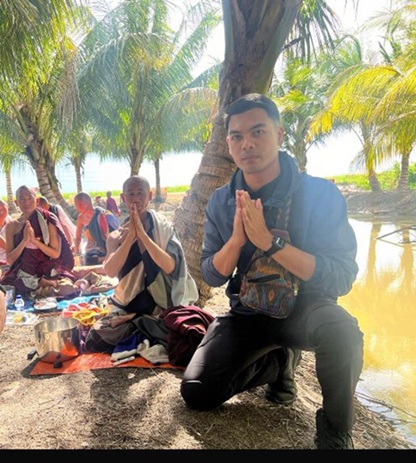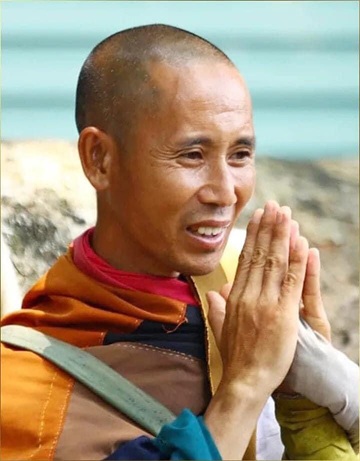April 25, 2025
Dhutanga Revival

Thai Security Guard's THoughts about Master Minh Tue Group's Pilgrimage journey
By Phai, Thailand
My name is Phai, I am a Thai Buddhist. I have received what I consider to be one of the greatest opportunities of my life — I was entrusted with an important mission: to take care of Venerable Master Min Tue, a Vietnamese monk, a spiritual pilgrim, and his group, who are highly respected by many people — both Vietnamese and others of different nationalities.
The mission this time was to facilitate their pilgrimage journey from Thailand to India. On the first day, I travelled to Phichit Province to meet the Master and his group. I arrived early in the morning around 5:00 a.m., before they went out on their alms round. I was surprised to see so many people waiting to offer alms — Thais, Vietnamese, and foreigners alike.
When I arrived, I bowed in respect to the Master and the monks, and informed them that I had been assigned to assist and oversee their pilgrimage as they passed through Thailand on the way to India. A Vietnamese interpreter helped translate. After hearing this, the Master smiled gently and thanked me.
During the pilgrimage through Thailand, I saw many people joining to walk with them — including many YouTubers who filmed and livestreamed along the way. To avoid disturbing road users, the monks walked twice daily: once in the late morning after alms collection, and again in the late afternoon until evening. When resting, Master Min Tue and the other monks did not lie down or lean against anything. They strictly followed the monastic discipline of not reclining — instead, they meditated while seated.
They would collect small pieces of cloth found along the road, sew them together into robes or blankets, and use them to protect themselves from insects, wind, or rain — following Buddhist principles. Their schedule was to walk about 30 kilometres per day, aiming to reach their destination before their passports expired.
Throughout the journey, there were many challenges — tests of faith for the pilgrimage group. Some locals didn’t understand why the monks were walking like this, as they had never seen such a large procession of disciples and support vehicles. Some YouTubers caused issues by filming local residents without consent. Thailand’s PDPA law prohibits posting photos or videos of others online without permission. Some even entered private properties along the road, causing disturbance. We had to explain and warn them about these laws to prevent problems during the pilgrimage.
While accompanying the group, I had the chance to talk with disciples and learn about Master Min Tue’s background. I found out that there were both supporters and detractors. Some people had falsely accused the Master of seeking fame or collecting donations for personal gain. In truth, the Master lives simply, has no wealth, and does not solicit or accept money for himself. Whenever someone donates or offers alms, he instructs his disciples to re-donate those items to temples or schools along the way. After witnessing everything myself, I realized the negative rumors were completely untrue — the Master was sincere, humble, and guided purely by faith.
Some groups tried to cause trouble by reporting the monks to Thai police, claiming some had expired or missing passports. After investigation, the authorities found no wrongdoing, so the monks were allowed to continue their pilgrimage. Along the way, countless Thai people offered alms. Many international disciples from various countries also joined to offer food and listen to the Master’s teachings. Sometimes, they received so many offerings that storing them risked spoilage. The Master instructed disciples to donate the surplus food and supplies to nearby schools or temples, turning excess into good deeds.
The original plan was to walk to the Mae Sai border in Chiang Rai to cross into Myanmar, then proceed to India. However, due to armed conflict between the Myanmar military and ethnic groups, they had to cancel and change the route. To comply with Thai law and ensure timely passport renewals, they decided to travel by car instead of walking, even though this went against the Master’s personal wishes. They then planned to renew their passports at Chiang Khong checkpoint instead.
When they reached Chiang Khong, unexpectedly, the border officials could not renew their passports for unknown reasons. This forced the group to leave Thailand within a short period. They therefore travelled southward to exit through the Sadao checkpoint into Malaysia. Despite the pressure of time, they successfully crossed the border and continued their pilgrimage in Malaysia — though only for a short time.
“This journey taught me that true faith is not found in comfort, but in patience, humility, and compassion. Witnessing Master Min Tue’s path reaffirmed my belief in the living spirit of the Buddha’s teachings.”
May the Dhutanga path continue to inspire all beings toward mindfulness and peace.





